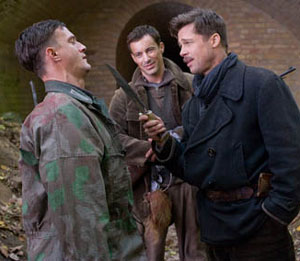 Universal Pictures
Universal Pictures
153 min., dir. by Quentin Tarantino, with Brad Pitt, Eli Roth, and Til Schweiger
The hype of Inglourious Basterds has many people saying it marks Quentin Tarantino’s best film in years. After seeing the movie for myself, I have only one question to those making that statement: How can you tell?
Related Posts
Not to say that this romping, rampaging, Nazi-killing piece of cinema isn’t highly entertaining in every way. As a loyal Tarantino fan throughout the years, I’ll be the first to say he’s done it again. But while I mean that to be a compliment to the iconic filmmaker’s work, I also mean it in the most literal sense.
Quentin Tarantino has done what he’s shown us before…again.
As a typical, everyday audience member, it’s impossible for me to say whether Tarantino is poking fun at himself with his gratuitous style choices or if he really believes audiences won’t question the method of his madness. I, for one, sincerely hope the prior is true since it allows me to laugh with instead of shake my head at Tarantino’s recycled bag of tricks.
For example, the film begins with the words “Chapter One” fading up onto a black screen. I could hear stifled chuckles in the darkness of the theater, from people all probably thinking the same thing: didn’t we just see this in Kill Bill? And while Kill Bill’s length was of epic standards (so much that it had to be told in two different volumes), the use of chapters seemed traditionally appropriate. (i.e., The Star Wars saga). But again here? Personally, I don’t understand its purpose.
Nor do I get the use of freeze frames with 1970s-style font splayed across the scene to introduce characters. Although this would’ve made total sense in the grindhouse salute, Death Proof, or again, in Kill Bill — a tribute to ‘70s-style samurai flicks — here it only proves to be distracting and inappropriate. Especially since Tarantino only utilizes the effect one time, which only makes the randomness of the moment stand out more. And while we’re on the subject, halfway or so through the film we suddenly hear voiceover narration from none other than Samuel Jackson. Now don’t get me wrong, I’ll take Sam Jackson in a movie any day of the week, but weaseling in a random voiceover in just one scene seems obviously lazy to me. Could Tarantino not think of another more creative way to communicate this necessary exposition? It would appear so.
But I’ll lay off of QT’s case for a moment since he did manage to put together one of the best casts I’ve seen in quite some time. Brad Pitt is unarguably the big name in the credits and plays his part of smug, southern lieutenant Aldo Raine perfectly. Pitt keeps you smiling in every scene he’s in with his hilarious facial expressions paired with a great southern accent and scrappy leadership.
Pitt shares the spotlight with his other fellow soldiers, who include Eli Roth, BJ Novak, and Til Schweiger. Roth, alongside Death Proof alumni Omar Doom, split sides with laughter as their characters, who only know the word for “excuse me,” pretend to be Italians in a theater full of Nazis. And Novak, best known from TV’s “The Office,” brings some huge laughs of his own when he discovers the less-than-fear-inducing nickname his enemies have given him. And then there’s also Schweiger, who doesn’t need spoken lines to omit more emotion and intensity than anyone on screen. I’ll forever be in Tarantino’s favor if this movie brings the much deserved attention to this German actor, who has gone underrated since in his appearance in SLC Punk!
The same can be said for Christoph Waltz. Waltz plays, hands down, one of the best antagonists I’ve ever seen on screen. As Nazi Colonel Hans Landa (or, “The Jew Hunter”), Waltz brings breath-shortening suspense to all of his dialogue. To put it bluntly, Hans Landa is deliciously diabolical, the threat of violence always present under his deceitfully cheery demeanor.
So yes, the film does contain incredibly long conversations that would never go unedited from most other scripts. And yes, even in a movie that takes place during the 1940s, Tarantino has managed to fit in dialogue that boasts his infinite trivial knowledge of film history and pop culture. But at this point, 17 years since Tarantino’s debut, should we really expect any less? I would hope not. But I would also hope for a little more. Or at least something a little different. Maybe next time. Until then, I’ll enjoy all the blood, bullets, and Nazi scalping with a great big smile on my face.